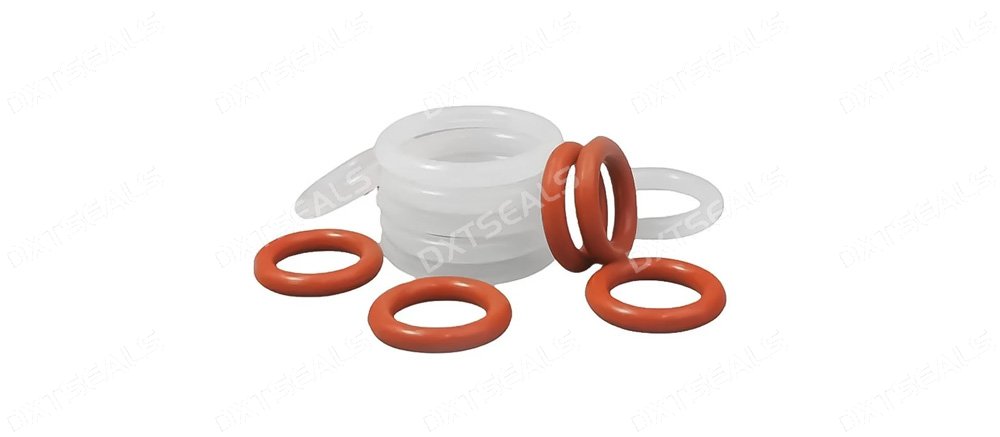
Silicone seals are widely recognized for their superior performance in extreme temperature conditions, making them a top choice for industries that require reliable and durable sealing solutions. Whether it's extremely high or low temperatures, silicone seals offer unmatched resistance while maintaining flexibility, ensuring that equipment functions efficiently without leaks or failures. In this article, we'll explore how silicone seals perform under extreme temperatures and highlight their key uses and advantages.
1. What Makes Silicone Seals Unique for Extreme Temperatures?
Silicone rubber is a synthetic material known for its excellent thermal stability. It can withstand temperatures ranging from as low as -60°C (-76°F) to as high as +230°C (+446°F) or more, depending on the specific silicone formulation. This broad temperature range allows silicone seals to maintain their sealing properties in environments where other materials might degrade, harden, or lose elasticity.
Key features of silicone seals under extreme temperatures include:
- High Heat Resistance: Silicone seals remain flexible and durable even at very high temperatures, ensuring a secure seal in applications such as engine gaskets, industrial machinery, and ovens.
- Cold Resistance: Silicone maintains its elasticity in freezing temperatures, making it suitable for applications like refrigeration and outdoor equipment exposed to extreme cold.
- Minimal Degradation: Silicone seals resist cracking, shrinking, or hardening due to heat or cold, which prevents leaks and extends their service life.
2. Advantages of Using Silicone Seals in High-Temperature Environments
Temperature Flexibility: One of the primary advantages of silicone seals is their ability to operate efficiently across a wide temperature range. They provide consistent performance in both low and high-temperature environments, where other seal materials may fail.
- Chemical Resistance: Silicone seals offer excellent resistance to many chemicals, oils, and water-based substances, making them versatile for various applications. This property is essential when dealing with harsh chemicals or liquids in extreme temperature settings.
- Durability: Silicone seals are highly durable and exhibit excellent resilience under both mechanical and thermal stress. They resist wear and tear, even after repeated exposure to extreme conditions.
- Long-Term Reliability: Thanks to their resistance to weathering, UV light, and oxidation, silicone seals maintain their properties over long periods, reducing the need for frequent replacements and minimizing maintenance costs.
3. Applications of Silicone Seals in Extreme Temperature Conditions
Silicone seals are ideal for industries that require reliable sealing solutions under extreme temperature conditions. Some of their key applications include:
- Aerospace and Aviation: In aerospace applications, silicone seals are used in components like engines, fuel systems, and electrical systems, where extreme temperatures are common. Their ability to withstand high altitudes and low pressures also adds to their suitability.
- Automotive Industry: Silicone seals are commonly used in engine gaskets, exhaust systems, and high-temperature automotive applications due to their heat resistance and ability to maintain performance in hot environments.
- Food Processing and Packaging: In industries where food safety is critical, food-grade silicone seals are often used in ovens, fryers, and other high-temperature cooking equipment. Silicone's non-toxic nature and heat resistance make it the preferred choice for food-grade sealing solutions.
- Medical Devices: Silicone's biocompatibility and ability to endure sterilization processes make it ideal for medical seals, especially in applications where temperature fluctuation is common.
- Industrial Machinery: In heavy-duty machinery, silicone seals are used in gaskets and sealing applications where high heat or cold is generated, ensuring proper functionality and reducing the risk of leaks.
4. Comparing Silicone Seals to Other High-Temperature Seal Materials
While silicone seals are excellent for extreme temperatures, they are not the only material options available. Here's how silicone compares to other common sealing materials:
- Nitrile (NBR): NBR seals are known for their oil and chemical resistance but have a much narrower temperature range (-40°C to +120°C). They are unsuitable for extremely high or low temperatures, unlike silicone.
- Fluorocarbon (FKM): FKM seals are excellent for high-temperature applications, with resistance up to +250°C (+482°F). However, they may lack the flexibility and cold resistance offered by silicone in extremely low-temperature environments.
- EPDM: While EPDM seals provide good temperature resistance and durability, they are typically used in lower temperature ranges and lack the high-heat performance of silicone.
5. Why Choose Silicone Seals for Extreme Temperatures?
Silicone seals offer a combination of high temperature resistance, flexibility, and durability, making them the best choice for industries where extreme heat or cold is present. Their long-term reliability and ability to maintain performance under harsh conditions make them a cost-effective sealing solution. Additionally, silicone's chemical and weather resistance further enhance its versatility across various applications.
6. Conclusion
Silicone seals provide excellent performance in extreme temperature environments, making them a preferred sealing material across various industries. Their ability to resist high heat, maintain flexibility in cold temperatures, and offer chemical resistance makes them highly versatile. Whether you are in the automotive, aerospace, food processing, or industrial sector, silicone seals are a reliable choice for ensuring the longevity and efficiency of your equipment.
